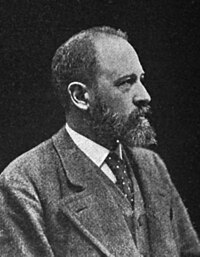Sergei Shevitch
This article or section is in a state of significant expansion or restructuring. You are welcome to assist in its construction by editing it as well. If this article or section has not been edited in several days, please remove this template. If you are the editor who added this template and you are actively editing, please be sure to replace this template with {{in use}} during the active editing session. Click on the link for template parameters to use.
This article was last edited by Carrite (talk | contribs) 11 years ago. (Update timer) |

Sergei Shevitch (spelled variously, c. 1848-c. 1910) (Russian: Сергей Шевич) was a Russian-born ethnic German newspaper editor and socialist political activist. As editor of the New Yorker Volkszeitung (New York People's News) from 1879 to 1890, Shevitch emerged as arguably the most important leader of the Socialist Labor Party of America. Shevitch and his wife, the former princess Helene von Racowitza, returned to Russia in 1890 to avoid loss of his estate lands to the crown owing to emigration. Following several years on his estate, Shevitch emigrated again, this time to Germany, where he would die by his own hand around 1910.
Biography
Sergei Shevitch was born in Russia in approximately 1848.[1] Of noble birth and radical political proclivities, Shevitch attended university in Russia before emigrating to Paris.[2] It was there that he met and married the former Helene von Racowitza, over whom socialist leader Ferdinand Lassalle lost his life in a duel in 1864.[2] The pair emigrated to the United States in 1877.[1]
At the time of Shevitch's arrival in America, the socialists of New York had only recently launched a newspaper, the Volkszeitung, and were in search of a professional editor.[2] The erudite Shevitch filled this role magnificently and he would remain at the helm of this leading left wing daily for more than a decade — this being, it is to be remembered, a time in which the majority of the American socialist movement was German-speaking. Shevitch developed fluency and oratorical skill in English as well, which he put to the test against Henry George in a memorable debate held a the Cooper Union.[2]
